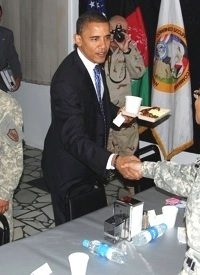
A new ABC News/Washington Post telephone poll of 1,288 adults indicates that support for the war in Afghanistan has hit a new low, and President Obama’s approval rating for handling it has also declined sharply.
The number of Americans who say the war in Afghanistan has been worth fighting has declined from 52 percent in December to 43 percent now. The President’s approval rating for handling the war, which was 56 percent in April, is now down to 45 percent. The poll also asked those interviewed if the war in Iraq has been worth fighting, and almost the same percentage as those answering the same question about Afghanistan — 42 percent — replied in the affirmative. However, while the numbers for Afghanistan declined by 10 points, those for Iraq increased by eight points during the last year.
ABC News reported on July 16 that 71 percent of those polled favor removing all remaining U.S. combat troops from Iraq, an action scheduled to take place by the end of August, but 60 percent support keeping up to 50,000 “non-combat” support troops in that country.
Forty-five percent said Obama’s plan to start withdrawing troops from Afghanistan by next summer is "about right," but another 31 percent favor starting the withdrawal sooner.
Another question asked those polled if the wars in Afghanistan and Iraq have improved the security of the United States and a small majority — 53 percent — said yes for Afghanistan with 50 percent saying the same was true for Iraq. Only 25 percent said both wars did "a great deal" to improve our nation’s long-term security.
The percentage of those who expressed approval of President Obama’s leadership of the war in Afghanistan has steadily fallen:? from 63 percent shortly after he took office, to 56 percent in April, to only 45 percent in this latest poll.
One surprising set of responses came from military veterans, a group that includes more Republicans than the general population and is usually more inclined to be supportive of the military. Only 49 percent of the veterans said the war was worth its costs, while 50 percent said it was not.
A July 14 New York Times article, “Poll Finds Pessimism on the War,” cited a CBS News poll conducted by telephone July 9-12 among 966 adults which said that 62 percent of those polled believed that the war in Afghanistan is going badly, up from 49 percent who held that opinion in May. When asked about President Obama’s handling of the war, 43 percent said they approve, and 44 percent said they disapprove.
The decrease in support for the war and the loss of confidence in President Obama’s handling of the war effort is reminiscent of the decline in support for the war in Vietnam that haunted another Democrat President — Lyndon Johnson. After Johnson fared poorly in the New Hampshire presidential primary in 1968, he decided not to run for reelection.
When famed evening news broadcaster Walter Cronkite delivered an editorial expressing his opinion that the war in Vietnam was not winnable, Johnson is reported to have said, "If I’ve lost Cronkite, I’ve lost Middle America."
Johnson would later lament:
I knew from the start that I was bound to be crucified either way I moved. If I left the woman I really loved?— the Great Society — in order to get involved in that bitch of a war on the other side of the world, then I would lose everything at home. All my programs…. But if I left that war and let the Communists take over South Vietnam, then I would be seen as a coward and my nation would be seen as an appeaser and we would both find it impossible to accomplish anything for anybody anywhere on the entire globe.
If Obama’s political career goes the way of Lyndon Johnson’s, it may provide one plausible explanation for how this unknown political upstart from Chicago managed to assume an office for which dozens of other politicians were better qualified by virtue of much greater experience — the party just might have been looking for someone to wear the captain’s cap while the ship of state went down.
Photo: Then-Sen. Barack Obama during a breakfast with U.S. troops at Camp Eggers in Kabul, Afghanistan, July 20, 2008: AP Images

